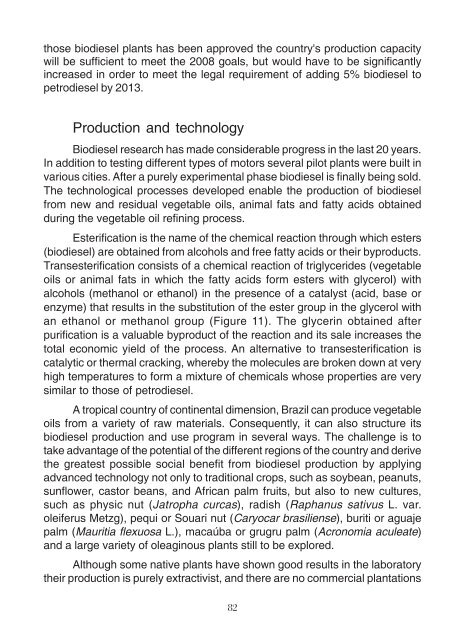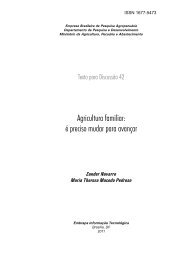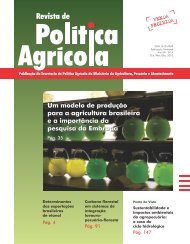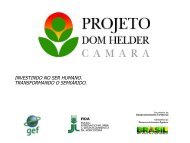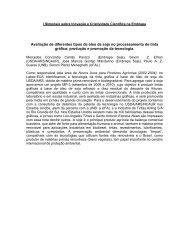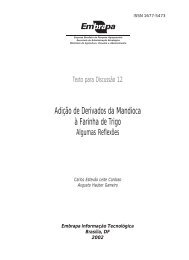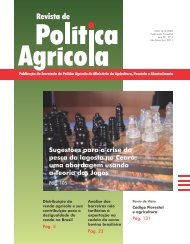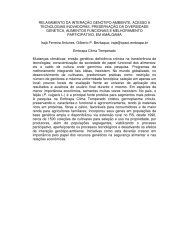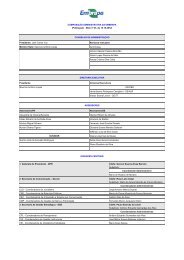Ministry of Agriculture, Livestock and Food Supply - Embrapa
Ministry of Agriculture, Livestock and Food Supply - Embrapa
Ministry of Agriculture, Livestock and Food Supply - Embrapa
Create successful ePaper yourself
Turn your PDF publications into a flip-book with our unique Google optimized e-Paper software.
those biodiesel plants has been approved the country's production capacity<br />
will be sufficient to meet the 2008 goals, but would have to be significantly<br />
increased in order to meet the legal requirement <strong>of</strong> adding 5% biodiesel to<br />
petrodiesel by 2013.<br />
Production <strong>and</strong> technology<br />
Biodiesel research has made considerable progress in the last 20 years.<br />
In addition to testing different types <strong>of</strong> motors several pilot plants were built in<br />
various cities. After a purely experimental phase biodiesel is finally being sold.<br />
The technological processes developed enable the production <strong>of</strong> biodiesel<br />
from new <strong>and</strong> residual vegetable oils, animal fats <strong>and</strong> fatty acids obtained<br />
during the vegetable oil refining process.<br />
Esterification is the name <strong>of</strong> the chemical reaction through which esters<br />
(biodiesel) are obtained from alcohols <strong>and</strong> free fatty acids or their byproducts.<br />
Transesterification consists <strong>of</strong> a chemical reaction <strong>of</strong> triglycerides (vegetable<br />
oils or animal fats in which the fatty acids form esters with glycerol) with<br />
alcohols (methanol or ethanol) in the presence <strong>of</strong> a catalyst (acid, base or<br />
enzyme) that results in the substitution <strong>of</strong> the ester group in the glycerol with<br />
an ethanol or methanol group (Figure 11). The glycerin obtained after<br />
purification is a valuable byproduct <strong>of</strong> the reaction <strong>and</strong> its sale increases the<br />
total economic yield <strong>of</strong> the process. An alternative to transesterification is<br />
catalytic or thermal cracking, whereby the molecules are broken down at very<br />
high temperatures to form a mixture <strong>of</strong> chemicals whose properties are very<br />
similar to those <strong>of</strong> petrodiesel.<br />
A tropical country <strong>of</strong> continental dimension, Brazil can produce vegetable<br />
oils from a variety <strong>of</strong> raw materials. Consequently, it can also structure its<br />
biodiesel production <strong>and</strong> use program in several ways. The challenge is to<br />
take advantage <strong>of</strong> the potential <strong>of</strong> the different regions <strong>of</strong> the country <strong>and</strong> derive<br />
the greatest possible social benefit from biodiesel production by applying<br />
advanced technology not only to traditional crops, such as soybean, peanuts,<br />
sunflower, castor beans, <strong>and</strong> African palm fruits, but also to new cultures,<br />
such as physic nut (Jatropha curcas), radish (Raphanus sativus L. var.<br />
oleiferus Metzg), pequi or Souari nut (Caryocar brasiliense), buriti or aguaje<br />
palm (Mauritia flexuosa L.), macaúba or grugru palm (Acronomia aculeate)<br />
<strong>and</strong> a large variety <strong>of</strong> oleaginous plants still to be explored.<br />
Although some native plants have shown good results in the laboratory<br />
their production is purely extractivist, <strong>and</strong> there are no commercial plantations<br />
82


